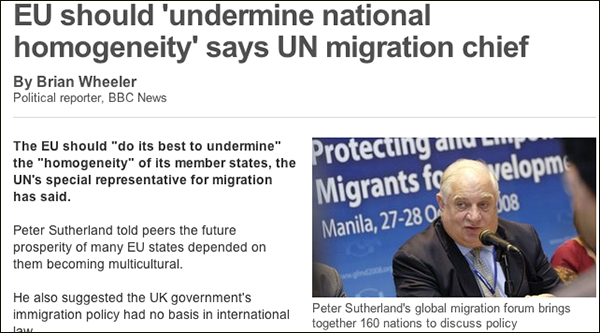Habro hilo nuevo porque ya es hora de llamar las cosas por su nombre
Politicos de diversos paises, periodistas y mucha gente importante ya lo ha estado escribiendo y dicendo durante bastante tiempo.
O sea que no es un secreto .
El otro hilo para los que llegan y éste para entender el porqué llegan y porque se sigue dejando entrar a más y más gente.
Es que si no separamos se confunden muchas cosas
Pongo esto para empezar: (sacado del otro hilo) por si alguien no lo ha visto
................................................................................................................................
http://www.un.org/esa/population/publications/migration/presssp.htm
Press Release
La División de Población de Naciones Unidas publica un nuevo informe
sobre migraciones de reemplazo
La División de Población del Departamento de Asuntos Económicos y Sociales ha publicado un nuevo informe titulado "Migraciones de Reemplazo: ¿Una Solución ante la Disminución y el Envejecimiento de las Poblaciones?". El término migraciones de reemplazo se utiliza para definir el nivel de migraciones internacionales necesario en cada país para evitar la disminución y el envejecimiento de la población que resultan de tasas de fecundidad y de mortalidad bajas.
Las proyecciones de las Naciones Unidas indican que, entre 1995 y 2050, la población disminuirá en Japón y en prácticamente todos los países europeos. Países como Bulgaria, Estonia e Italia podrían perder la cuarta parte o un tercio de su población. La tendencia al envejecimiento persistirá, y la edad media de la población alcanzará máximos históricos. En Italia, por ejemplo, la edad media aumentará de 41 años en el 2000 a 53 en el 2050. En la mayoría de países, el cociente de dependencia potencial –número de personas en edad activa (de 15 a 64 años) por persona mayor- pasará de 4 ó 5 a 2.
Partiendo de estas dos tendencias críticas, el informe examina en detalle ocho países con fecundidad baja (Alemania, los Estados Unidos, la Federación Rusa, Francia, Italia, Japón, el Reino Unido y la República de Corea) y dos regiones (Europa y la Unión Europea). En cada caso se consideran escenarios alternativos para el período 1995-2000 y se analiza el impacto de varios niveles de inmigración sobre el tamaño de la población y sobre el envejecimiento.
Los resultados principales del informe indican que:
Politicos de diversos paises, periodistas y mucha gente importante ya lo ha estado escribiendo y dicendo durante bastante tiempo.
O sea que no es un secreto .
El otro hilo para los que llegan y éste para entender el porqué llegan y porque se sigue dejando entrar a más y más gente.
Es que si no separamos se confunden muchas cosas
Pongo esto para empezar: (sacado del otro hilo) por si alguien no lo ha visto
................................................................................................................................
http://www.un.org/esa/population/publications/migration/presssp.htm
Press Release
La División de Población de Naciones Unidas publica un nuevo informe
sobre migraciones de reemplazo
La División de Población del Departamento de Asuntos Económicos y Sociales ha publicado un nuevo informe titulado "Migraciones de Reemplazo: ¿Una Solución ante la Disminución y el Envejecimiento de las Poblaciones?". El término migraciones de reemplazo se utiliza para definir el nivel de migraciones internacionales necesario en cada país para evitar la disminución y el envejecimiento de la población que resultan de tasas de fecundidad y de mortalidad bajas.
Las proyecciones de las Naciones Unidas indican que, entre 1995 y 2050, la población disminuirá en Japón y en prácticamente todos los países europeos. Países como Bulgaria, Estonia e Italia podrían perder la cuarta parte o un tercio de su población. La tendencia al envejecimiento persistirá, y la edad media de la población alcanzará máximos históricos. En Italia, por ejemplo, la edad media aumentará de 41 años en el 2000 a 53 en el 2050. En la mayoría de países, el cociente de dependencia potencial –número de personas en edad activa (de 15 a 64 años) por persona mayor- pasará de 4 ó 5 a 2.
Partiendo de estas dos tendencias críticas, el informe examina en detalle ocho países con fecundidad baja (Alemania, los Estados Unidos, la Federación Rusa, Francia, Italia, Japón, el Reino Unido y la República de Corea) y dos regiones (Europa y la Unión Europea). En cada caso se consideran escenarios alternativos para el período 1995-2000 y se analiza el impacto de varios niveles de inmigración sobre el tamaño de la población y sobre el envejecimiento.
Los resultados principales del informe indican que:
- Durante los próximos 50 años, la población de la mayoría de los países desarrollados va a disminuir y envejecer como resultado de niveles de fecundidad y mortalidad bajos. Por el contrario, la población de los Estados Unidos va aumentar en casi un 25 por ciento. De los países examinados, Italia experimentará el mayor descenso poblacional en términos relativos, ya que perderá el 28 por ciento de su población entre 1995 y 2050 según la variante media de las proyecciones de Naciones Unidas. La Unión Europea, cuya población superaba en 1995 la población de los Estados Unidos en 105 millones, tendrá 18 millones menos que este país en 2050.
- La disminución de la población es inevitable en ausencia de migraciones de reemplazo. Los niveles de fecundidad podrían aumentar en las próximas décadas, pero es improbable que se alcancen niveles de reemplazo en la mayoría de países.
- Es necesario mantener ciertos niveles de inmigración para evitar el descenso poblacional en todos los países y regiones incluidos en el informe. No obstante, hay divergencias importantes entre los niveles de inmigración necesarios y la experiencia actual de los países. En el caso de la Unión Europea, los niveles de inmigración observados durante los años noventa serían casi suficientes para evitar el descenso poblacional, mientras que para Europa en general, habría que duplicar el número de inmigrantes. La República de Corea precisaría un flujo de inmigrantes relativamente modesto –un cambio fundamental, sin embargo, para un país que hasta el momento ha experimentado emigración neta. En Italia y Japón se requerirían aumentos notables de los niveles de inmigración neta. Por el contrario, Francia, el Reino Unido y los Estados Unidos podrían mantener la población al nivel actual con un nivel de inmigración menor al observado recientemente.
- El número de inmigrantes necesario para evitar el descenso poblacional es considerablemente mayor que el proyectado por las Naciones Unidas. Los Estados Unidos constituyen la única excepción.
- El número de inmigrantes necesario para evitar un descenso de la población activa es más elevado que el requerido para evitar un descenso de la población total. En algunos casos, como el de la República de Corea, Francia, el Reino Unido o los Estados Unidos, el número es varias veces más elevado. Si tales flujos se produjeran, los inmigrantes llegados después de 1995 y sus descendientes representarían en el 2050 una proporción importante de la población total de los países examinados –entre el 30 y el 39 por ciento en el caso de Alemania, Italia y Japón.
- En términos relativos, Alemania e Italia precisarían el número más elevado de inmigrantes para mantener el tamaño de su población activa. Italia necesitaría anualmente 6.500 inmigrantes por millón de habitantes y Alemania necesitaría 6.000. Los Estados Unidos precisarían menos –1.300 inmigrantes por millón de habitantes anualmente.
- Los niveles de inmigración necesarios para evitar el envejecimiento poblacional son varias veces más elevados que los requeridos para prevenir un descenso de la población total. Mantener los cocientes de dependencia potencial constantes requeriría volúmenes de inmigración que están fuera de toda expectativa razonable.
- En ausencia de inmigración, los cocientes de dependencia potencial podrían mantenerse en los niveles actuales si se desplazase la edad de jubilación a los 75 años, aproximadamente.
- Los nuevos retos que presentan la disminución y el envejecimiento de la población requieren una revisión general de numerosas políticas y programas existentes, bajo una perspectiva de largo plazo. Entre los aspectos críticos que precisan re-evaluación están: (a) la edad de jubilación; (b) los niveles y tipos de pensiones de jubilación y salud para la gente mayor; (c) la participación en la fuerza de trabajo; (d) las contribuciones de trabajadores y empresarios a las pensiones de jubilación y salud para la gente mayor; y (e) las políticas y programas de inmigración, especialmente en relación a las migraciones de reemplazo y a la integración de contingentes importantes de inmigrantes y sus descendientes.
Última edición:


